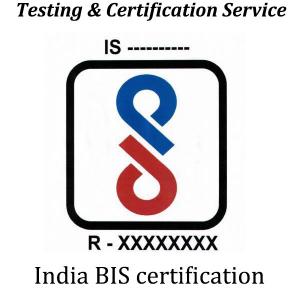

Add to Cart
ISI MARK INDIA BIS CERTIFICATION THE BUREAU OF INDIAN STANDARDS
Introduction of BIS certification in India
BIS certification is an Indian product certification, which is
being uploaded ... supervised by the Indian Bureau of Standards
(BIS). According to different types of products, BIS certification
is divided into three types, including mandatory ISI mark
certification, CRS certification, and voluntary certification. The
BIS certification system has a history of more than 50 years and
covers more than 1,000 products. All products listed in the
mandatory list must obtain BIS certification (ISI logo registration
certification) before they can be sold in India.
BIS is a third-party certification body. Products that pass its certification will be labeled with the ISI. This label has a large impact in India and surrounding countries. It has a good reputation and is a reliable guarantee for product quality. Once the product is marked with the "ISI mark", it means that it meets relevant Indian standards and consumers can buy with confidence.
In order to unify product regulatory standards and requirements to ensure product quality and safety, India began to implement a product certification system in 1955. According to the Indian Bureau of Standards Act 1986 (The BIS Act, 1986), India ’s product certification adopts the principle of voluntary certification, but taking into account factors such as public health and safety, and public consumption, the Indian government has issued instant laws to implement specific products Compulsory certification. Designed to provide end-users with quality-assured, safe and reliable products. All products listed in the compulsory certification must obtain a product certification certificate according to Indian product standards in order to enter the market. Therefore, manufacturers who want to enter the Indian market need to understand the Indian product certification system.
The first batch (MANDATORY): Certification fields BIS certification
is applicable to manufacturers in any country. The main
certification fields are: 1. Tires; 2. Electric irons, hot water
kettles, electric stoves, heaters and other household appliances;
3. Cement and concrete; 4 .Circuit breaker; 5. Steel; 6. Electric
energy meter; 7. Auto parts; 8. Food, milk powder; 9. Baby bottles;
10. Tungsten lamp; 11. Oil pressure furnace; 12. Large transformer;
13. Plug; 14 .Medium and high voltage wires and cables; 15.
Self-ballasted light bulbs. (Mandatory in batches starting from
1986)
The second batch (COMPULSORY): Products with mandatory registration
are electronic information technology equipment, including: 1.
Set-top boxes; 2. Portable computers; 3. Notebooks; 4. Tablet
computers; 5. Monitors with a screen size of 32 inches and above;
6. Video monitor; 7. Printer, plotter, scanner; 8. Wireless
keyboard; 9. Answering machine; 10. Automatic data processor; 11.
Microwave oven; 12. Projector; 13. With grid power supply
Electronic clock; 14. Power amplifier; 15. Electronic music system
(mandatory from March 2013)
The second batch of new additions (COMPULSORY): 16. IT equipment power adapter; 17. AV equipment power adapter; 18. UPS (uninterruptible power supply); 19. DC or AC LED module; 20. Battery; 21. Self-ballasted LED lights; 22. LED lamps; 23. Mobile phones; 24. Cash registers; 25. Sales terminal equipment; 26. Copiers; 27. Smart card readers and writers; 28. Postal processing machines, automatic stamping machines; 29. Pass reading device; 30. Mobile power supply. (Mandatory from November 2014).
1. Apply. Foreign manufacturers who want to obtain BIS certification generally need to use a special application form and prepare relevant documents to apply to the BIS New Delhi headquarters.
2. Record. BIS will review the application documents and
information submitted by the applicant, and if the procedures are
complete, the application will be recorded. Applicants must pay the
appropriate processing fee.
3. Initial factory inspection. BIS will assign a team of no more
than 2 officials to the factory for inspection. Applicants must
bear the expenses such as travel and visa fees for the official
delegation to go to the factory for inspection and the
corresponding inspection fees.
4. Issue a certificate. If the initial inspection and test results
are qualified, and the applicant agrees to implement the
BIS-approved inspection and test plan after certification and pays
the BIS marking fee, a certificate can be issued to the applicant.
The certificate is valid for 1 year. After the certificate is
awarded, the holder must pay the marking fee and the annual
certificate fee every year.
5. Post-certification supervision. BIS supervises the quality of
its certified products through routine supervision of licensees and
surprise inspections and testing of samples in factories and
markets. The certificate can be renewed if regular inspections are
carried out and the results of inspection and independent testing
by the factory or market meet the requirements. The certifier
applies for renewal to BIS by submitting the specified form. The
certificate renewal fee is 500 rupees. The licensor also needs to
bear the cost of sample inspection.
